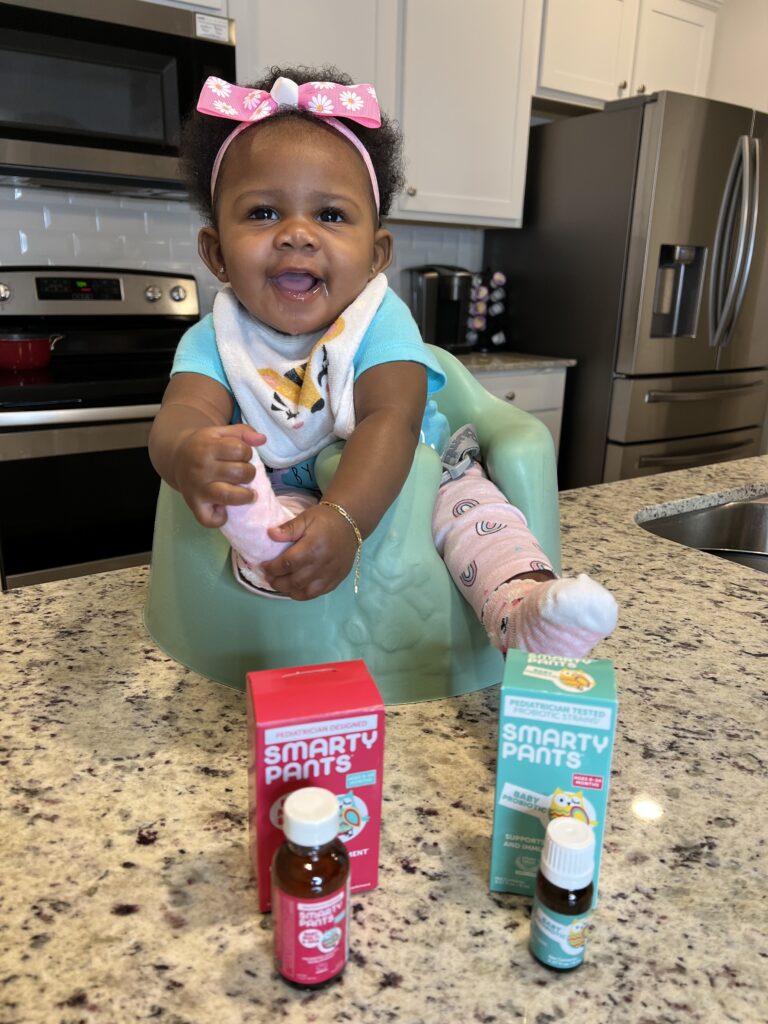
Let’s talk about common vitamins and supplements for babies. Your baby needs to get good nutrition for its growth and development. Some babies will need additional vitamins and minerals that are required to be added directly to breast milk or their formula. Seeking the expertise of a healthcare provider to help you fill your baby’s nutritional gaps with the best supplements is essential. Keep reading to learn about the most common vitamins and supplements recommended for babies from ages 0 to 12 months.
*All pictures are clickable links and will take you directly to item for purchase*
Iron
Babies are born with an iron reserve that will last about 4 to 6 months. The American Academy of Pediatrics recommends to start giving iron supplementation at 4 months for full-term infants who are exclusively or mostly breastfed.
Iron stores in children who are born prematurely or with a low birth weight may be depleted. If this is the case, your baby’s doctor will most likely recommend iron supplements until he or she is at least 6 to 12 months old. This may also be necessary for formula-fed babies. Serving iron-rich foods such as iron-fortified cereal, meat, or beans to infants at least twice a day will help them meet their iron needs when they start weaning.
Vitamin B12
Vitamin B12 is essential for preventing anemia. Additionally, it also encourages normal neurological function. Vitamin B12 can be found in animal products such as meat, fish, eggs, and dairy. Breastfeeding moms should consume a diet that contains adequate amounts of vitamin B12. This will ensure that the baby is being provided with proper amounts of B12 through breast milk.
Mothers who intend to feed their babies a plant-based diet will need to consider vitamin B12 supplementation. Vitamin B12 is commonly found in many over-the-counter infant vitamin drops, fortified ready-to-eat cereals and soy milk. It is always advisable to consult with your baby’s doctor before administering any supplements.
Vitamin C
Vitamin C, also known as ascorbic acid, is a water-soluble nutrient essential for many of your baby’s bodily functions. It is necessary for the maintenance of a healthy immune system, the enhancement of iron absorption, and the production of collagen.
Normally, your baby’s body cannot produce Vitamin C. Therefore, it has to be provided through breast milk, infant formula, and a variety of fruits and vegetables.
Vitamin D
Vitamin D aids the body’s absorption and retention of calcium and phosphorus that are necessary for the formation of strong bones. A lack of vitamin D can cause rickets-a bone-softening disease. Because breast milk does not contain enough vitamin D, all breastfed babies should be given a supplement.
Formula-fed babies generally do not require additional vitamin D supplementation because vitamin D is already present in the formula. The American Academy of Pediatrics recommends that all breastfed infants (both completely or partially breastfed) and formula-fed infants who consume less than 32 ounces of formula daily are required to start taking a supplement soon after birth.
DHA, An Important Omega-3
DHA, an omega-3 fatty acid important for infant brain and eye development, is present in breast milk in the same proportions that are present in your diet. DHA supplements are not typically recommended for babies, but breastfeeding mothers who do not consume a dietary source of DHA – vegetarians and vegans in particular – may want to consider taking a supplement. Vegetarians and vegans, as well as their infants, have lower blood levels of DHA than meat-eaters.
Elderberry
Elderberries are a great source of fiber and vitamin B6, nutrients that support digestion and neurological development. Elderberries also contain iron, which is important for your child’s growth and circulation. Black elderberries contain powerful antioxidants that can help support your baby’s developing immune system. Cooked elderberries may be introduced as soon as your baby is ready to start solids, which is generally around 6 months of age. Raw elderberries are not safe to eat.
Probiotics
Probiotics help to boost the amount of good bacteria in our digestive system so our bodies can function the way they are intended to. Without the proper balance of gut bacteria, babies may have colic, acid reflux, constipation, diarrhea, or other more serious digestive issues. Probiotics can be introduced to children at an early age because they are not harmful. However, they are not necessary for exclusively breastfed babies. After your baby starts solids, probiotics can be extremely beneficial.
Tips for safely giving vitamins and supplements to your child:
- Always read and follow the label directions. Pay close attention to the usage instructions and warnings.
- Be wary of potential issues.
- If you notice any new symptoms or side effects in your child, contact your health care provider immediately.
- Learn the abbreviations for medicine dosages: Teaspoon (tsp.), Tablespoon (tbsp.), Milligram (mg.), Milliliter (ml.), Ounce (oz.)
- Use the proper dosing device. Use the appropriate measuring device. Don’t use another item as a substitute.
- Consult your doctor or pharmacist before taking two medications at the same time. This way, you can avoid an overdose or an undesirable interaction.
- Adhere to age and weight recommendations. If the label states that it should not be given to children under a certain age or weight, then don’t.
- Always use a child-resistant cap and re-lock it after each use. Additionally, keep all medications out of the reach of children.
- Ask your health care provider to offer you advice if you have any concerning questions.
Final Take Away
I hope you have gained valuable insight regarding the best medicines, vitamins, and supplements for your little ones. As always, consult your baby’s health care professional prior to attempting anything mentioned. Cheers to good baby health!






